Associated Press
Wed, December 20, 2023
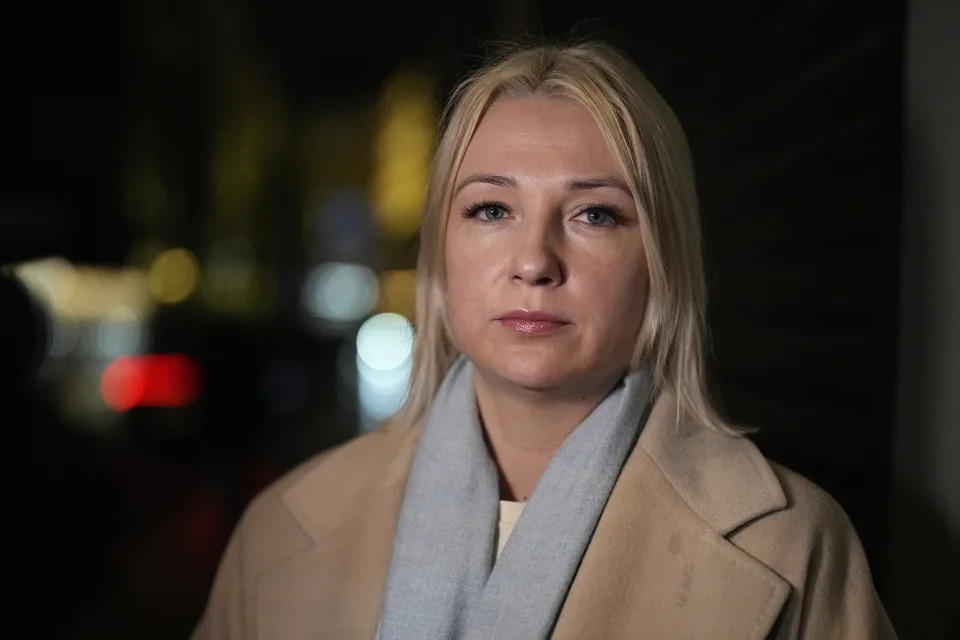
A Russian politician calling for peace in Ukraine presented documents Wednesday to Russia’s Central Election Commission to register as a candidate for the country’s 2024 presidential election.
Regional legislator Yekaterina Duntsova hopes to challenge Russian President Vladimir Putin, promoting her vision of a “humane” Russia “that’s peaceful, friendly and ready to cooperate with everyone on the principle of respect.”
Speaking to journalists in Moscow on Wednesday, Duntsova said she hoped the event would inspire her supporters. If accepted as an independent candidate, the former journalist would next need to gather 300,000 signatures of support from at least 40 Russian regions.
“I feel a sense of accomplishment: We’ve done everything that we needed to do. We’ve made this step, and I think it should inspire people who support us,” she said.
“(I hope that) I’ll at least be registered (as a candidate). But, of course, collecting signatures is a huge job and I hope that people will be actively taking part.”
Russia’s state parliament set March 17 as the date for the country’s 2024 presidential earlier this month, moving Putin a step closer to a fifth term in office.
The tight control that Putin has established over Russia’s political system during 24 years in power makes his reelection in March all but assured. Prominent critics who could challenge him are either in prison or living abroad, and most independent media have been banned.
Speaking to The Associated Press in a previous interview, Duntsova said she was afraid of the Kremlin’s previous targeting of opposition activists and protesters.
But she insisted it is necessary to “present an alternative” to Putin and his policies.
She said that if elected, her first presidential decree would mandate the release of Russia’s “political prisoners,” without giving names. In earlier statements she spoke of her readiness to free Putin’s arch-enemy, the anti-corruption activist Alexei Navalny.
Duntsova took her first steps toward candidate status Sunday, when her run was endorsed by 500 supporters as required by Russian election law.
More than 500 people gathered in Moscow to back the bid, according to Telegram updates by Sota, a Russian news publication covering the opposition, protests and human rights issues.
The meeting ultimately proceeded unimpeded, despite electricity at the venue briefly going out and security guards initially refusing to let some enter the building.
Regional legislator Yekaterina Duntsova hopes to challenge Russian President Vladimir Putin, promoting her vision of a “humane” Russia “that’s peaceful, friendly and ready to cooperate with everyone on the principle of respect.”
Speaking to journalists in Moscow on Wednesday, Duntsova said she hoped the event would inspire her supporters. If accepted as an independent candidate, the former journalist would next need to gather 300,000 signatures of support from at least 40 Russian regions.
“I feel a sense of accomplishment: We’ve done everything that we needed to do. We’ve made this step, and I think it should inspire people who support us,” she said.
“(I hope that) I’ll at least be registered (as a candidate). But, of course, collecting signatures is a huge job and I hope that people will be actively taking part.”
Russia’s state parliament set March 17 as the date for the country’s 2024 presidential earlier this month, moving Putin a step closer to a fifth term in office.
The tight control that Putin has established over Russia’s political system during 24 years in power makes his reelection in March all but assured. Prominent critics who could challenge him are either in prison or living abroad, and most independent media have been banned.
Speaking to The Associated Press in a previous interview, Duntsova said she was afraid of the Kremlin’s previous targeting of opposition activists and protesters.
But she insisted it is necessary to “present an alternative” to Putin and his policies.
She said that if elected, her first presidential decree would mandate the release of Russia’s “political prisoners,” without giving names. In earlier statements she spoke of her readiness to free Putin’s arch-enemy, the anti-corruption activist Alexei Navalny.
Duntsova took her first steps toward candidate status Sunday, when her run was endorsed by 500 supporters as required by Russian election law.
More than 500 people gathered in Moscow to back the bid, according to Telegram updates by Sota, a Russian news publication covering the opposition, protests and human rights issues.
The meeting ultimately proceeded unimpeded, despite electricity at the venue briefly going out and security guards initially refusing to let some enter the building.
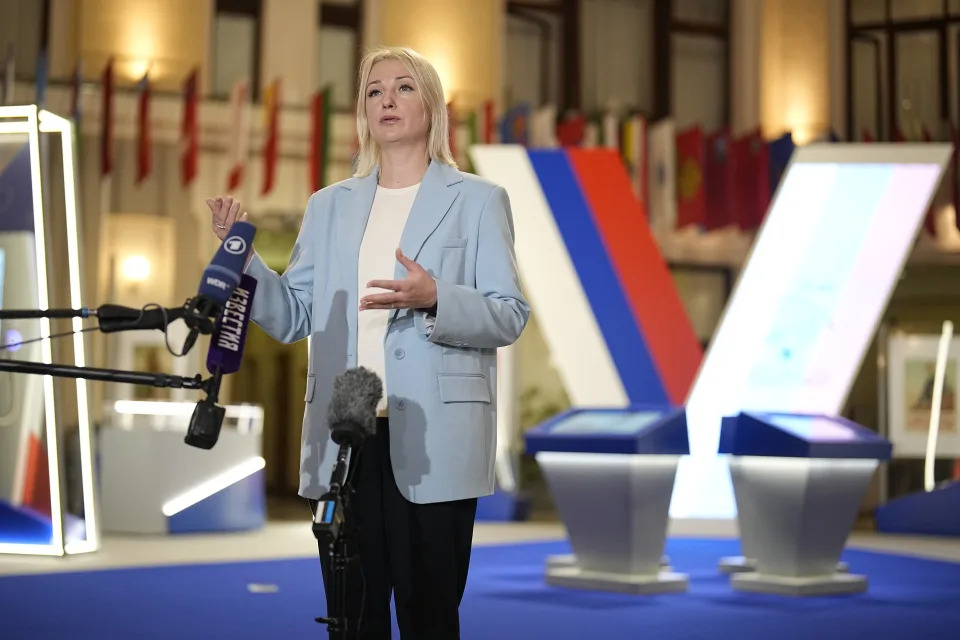
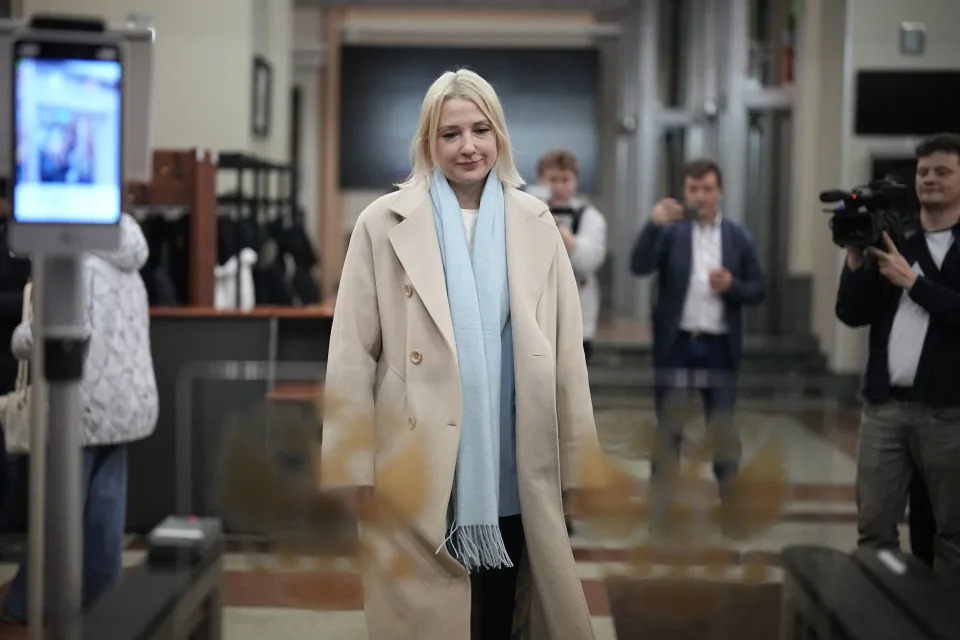
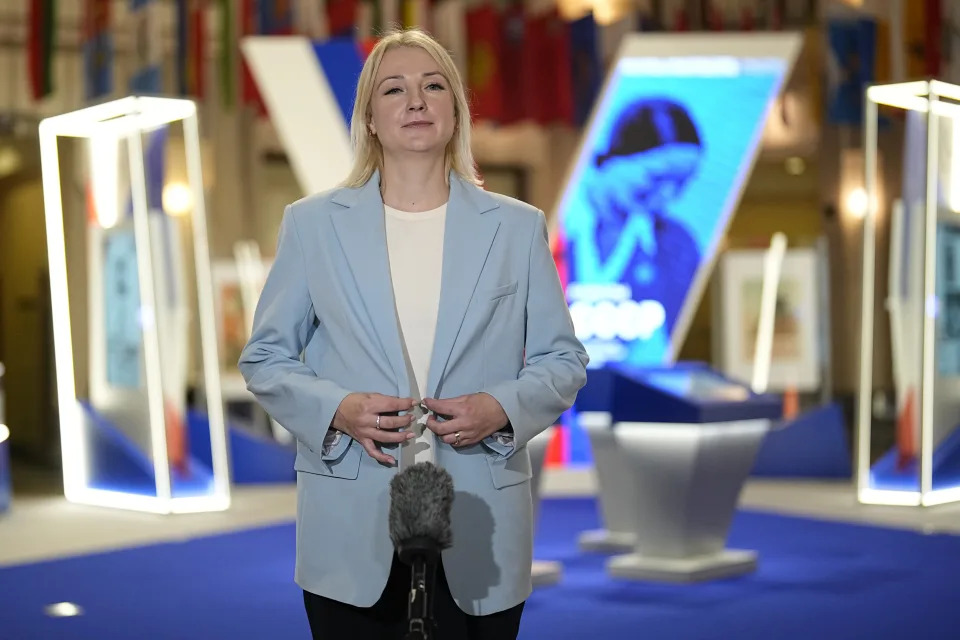
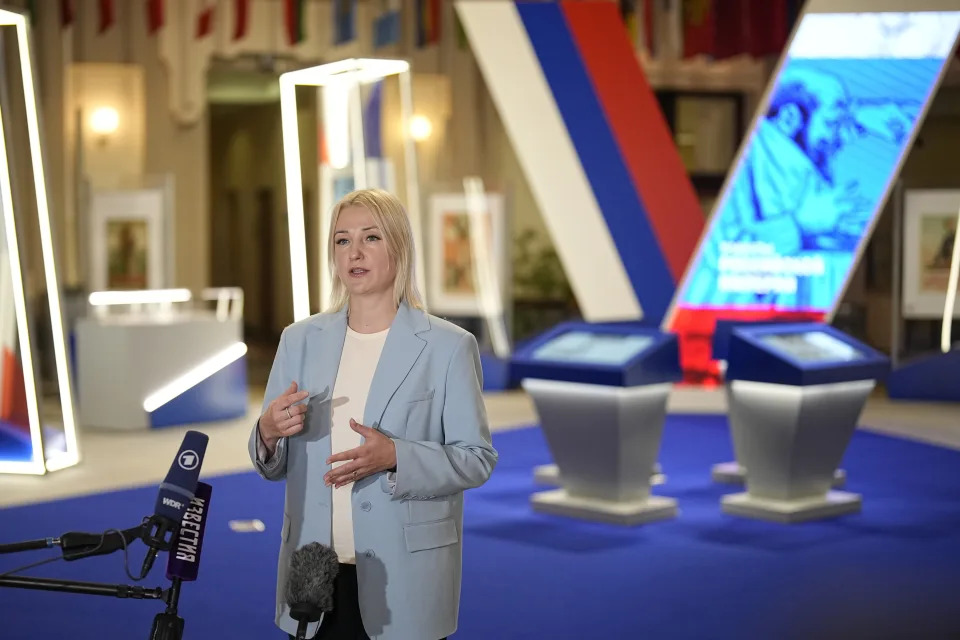
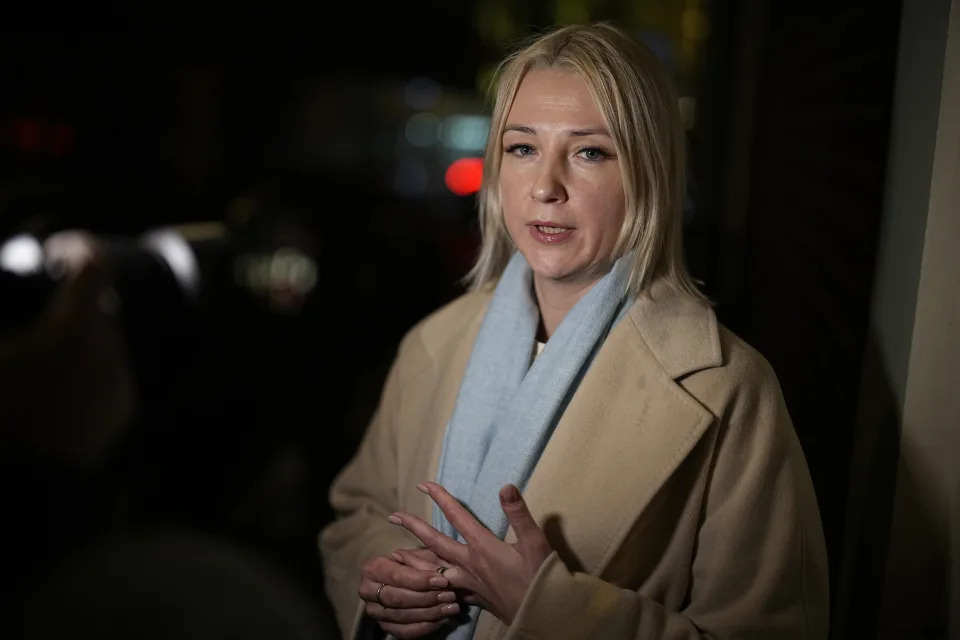
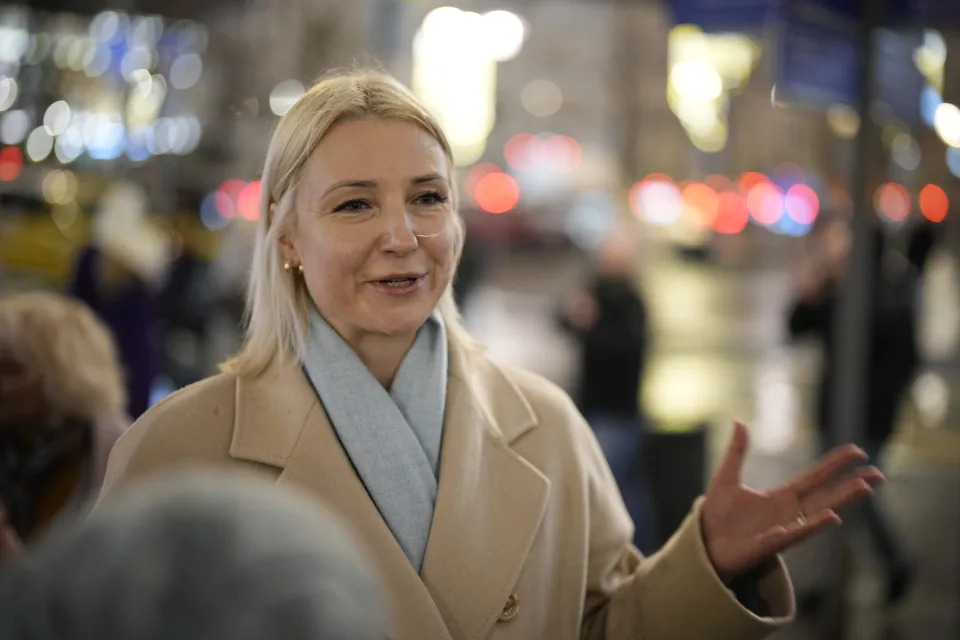
Russia Presidential Hopeful
Yekaterina Duntsova speaks to journalists after submitting her documents as a presidential candidate for the upcoming presidential election to Russia's Central Election Committee, in Moscow, Russia, Wednesday, Dec. 20, 2023. Duntsova is a journalist-turned-grassroots campaigner and local legislator. She secured a nomination from a group of more than 500 supporters as required by Russian electoral law from those not running on a party ticket. Delegates from Russia’s ruling party unanimously backed President Vladimir Putin’s bid for reelection at a party conference in Moscow on Sunday.
(AP Photo/Alexander Zemlianichenko)
Meet the Russian professor who became mayor of a Colombian city
ASTRID SUÁREZ
Wed, December 20, 2023
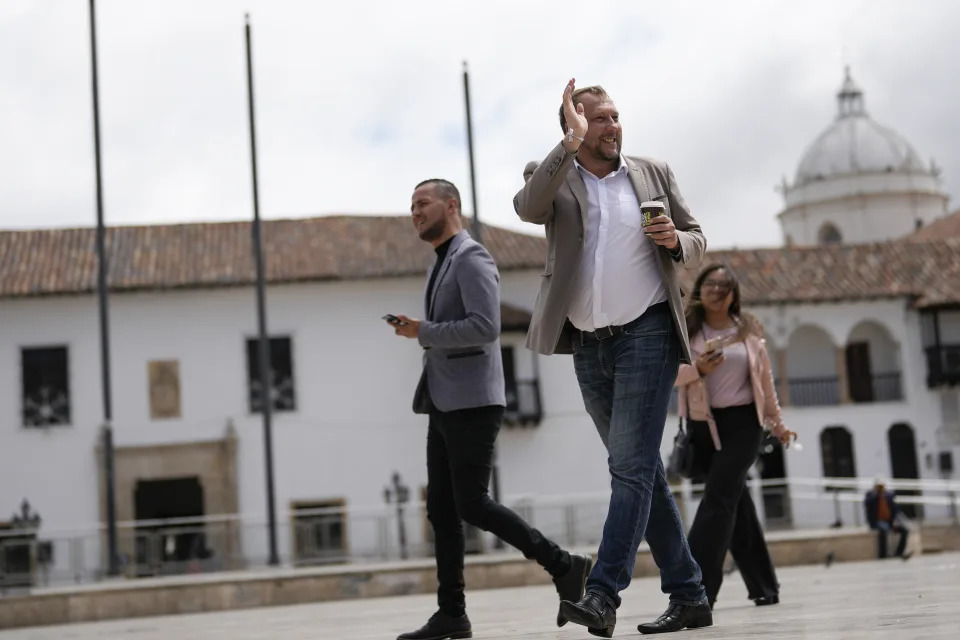
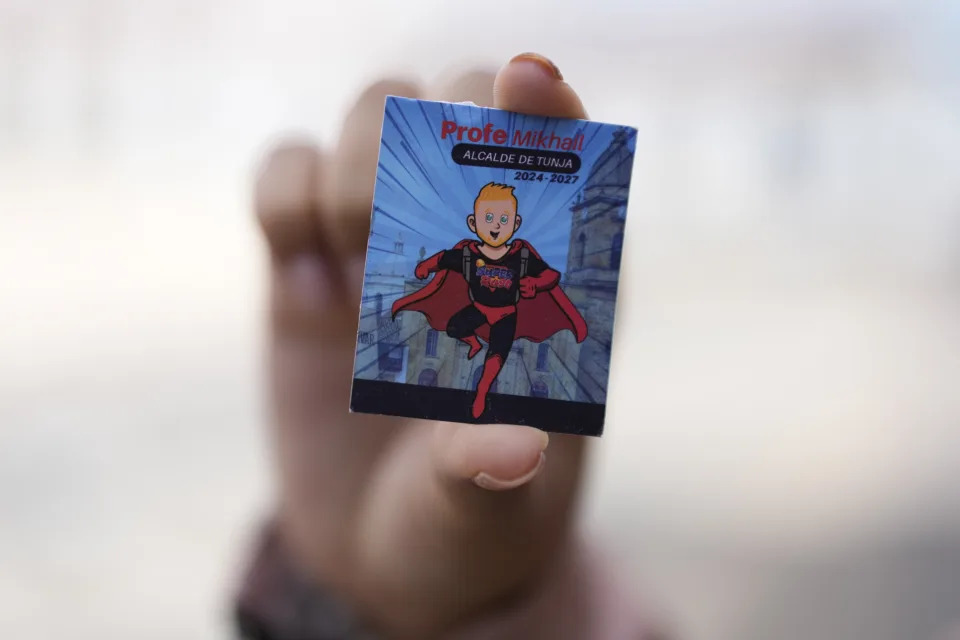



Colombia Russian Mayor
Mayor-elect Mikhail Krasnov waves to a supporter as he walks through Bolivar Square in Tunja, Colombia, Monday, Dec. 11, 2023. Krasnov, a 45-year-old university professor from Russia, was one of the unexpected winners in Colombia’s regional elections in October.
ASTRID SUÁREZ
Wed, December 20, 2023


Colombia Russian Mayor
Mayor-elect Mikhail Krasnov waves to a supporter as he walks through Bolivar Square in Tunja, Colombia, Monday, Dec. 11, 2023. Krasnov, a 45-year-old university professor from Russia, was one of the unexpected winners in Colombia’s regional elections in October.
(AP Photo/Fernando Vergara)
TUNJA, Colombia (AP) — Mikhail Krasnov walks along the steep streets of the Colombian city of Tunja just like any other resident — except he’s no longer just another neighbor.
Now people greet the newly elected mayor as he makes his way around town and stop him for pictures. One woman hugs the man known here as the “Russian professor” and poses for a selfie.
Krasnov, a 45-year-old university professor from Russia, was one of the unexpected winners in Colombia ’s regional elections in October. He prevailed by promising to stamp out corruption and embrace more meritocracy in the city government, where jobs often go to those with political connections.
He’s also trying to reduce the city’s debt.
“We are not here to promote my face,” said Krasnov, who has been interviewed by dozens of national media outlets and also a Russian network, since he won the election. “We want to send the message that Tunja exists, that we are competitive and want to attract investors.”
The blond and green-eyed professor stands out in Tunja, a city of 170,000 people in Colombia’s Andean highlands, where many residents are of Indigenous descent.
He is believed to be the only Russian living in the city, where he has been teaching economics and human rights courses at the local public university for the past decade.
Krasnov was born in Saratov, a city in southern Russia, in 1978. He arrived in Tunja in 2008 on a student exchange program, fell in love with the city’s food and culture, learnt Spanish and became a Colombian citizen two years ago.
“My mother has Ukrainian roots, my father is Russian and I am Colombian” he says proudly, adding that he opposes Russia’s invasion of Ukraine, where he has friends and family.
The professor says he decided to get involved in politics last year, due to his growing frustration with the city’s lack of progress in areas like job creation and poverty reduction.
“You reach an age where you start to ask yourself what you can contribute” to society, he said of his decision to enter the turbulent world of Colombian politics.
At first Krasnov tried to run as an independent, which meant he had to collect 30,000 signatures to get himself on the ballot.
After collecting the signatures however, Krasnov discovered there was another requirement for registering as a candidate – a $10,000 fee.
That was too much for Krasnov’s modest budget, but his growing fame and commitment to campaigning got him noticed by some political parties, who have the right to register candidates.
Eventually Krasnov was put on the ballot by The Force for Peace, a party founded last year by the former president of Colombia’s congress.
Krasnov describes himself as a centrist, and jokes about the campaign, in which he ran against several candidates that were better funded and represented traditional parties that have run the city for years.
In the nine-candidate race Krasnov also defeated a politician from President Gustavo Petro’s leftist party, the Historical Pact.
“I’m a public university professor, who was born in the Soviet Union, so you’d think I’d be on the left” he said. “But the leftists were the first ones to attack me, even when I was collecting signatures, because I also appealed to their voters.”
Krasnov won the election with 31% of the overall vote.
“It was a big surprise,” said Alejandra Monroy Martínez, a political scientist based in Tunja, who remembers seeing Krasnov handing out flyers and talking to people on the city’s streets. She said his victory reflects a growing dissatisfaction with the city’s political class.
Alba Rodríguez Parra, 56, said she trusts “the Russian” because he was a professor at the city’s public university, speaks six languages and has several degrees.
She’s hoping that the new mayor can reduce growing crime rates and help to expand the streets that lead into the city center and are sometimes jammed with cars.
“Previous mayors have let us down, because they pocketed all the money” she said.
TUNJA, Colombia (AP) — Mikhail Krasnov walks along the steep streets of the Colombian city of Tunja just like any other resident — except he’s no longer just another neighbor.
Now people greet the newly elected mayor as he makes his way around town and stop him for pictures. One woman hugs the man known here as the “Russian professor” and poses for a selfie.
Krasnov, a 45-year-old university professor from Russia, was one of the unexpected winners in Colombia ’s regional elections in October. He prevailed by promising to stamp out corruption and embrace more meritocracy in the city government, where jobs often go to those with political connections.
He’s also trying to reduce the city’s debt.
“We are not here to promote my face,” said Krasnov, who has been interviewed by dozens of national media outlets and also a Russian network, since he won the election. “We want to send the message that Tunja exists, that we are competitive and want to attract investors.”
The blond and green-eyed professor stands out in Tunja, a city of 170,000 people in Colombia’s Andean highlands, where many residents are of Indigenous descent.
He is believed to be the only Russian living in the city, where he has been teaching economics and human rights courses at the local public university for the past decade.
Krasnov was born in Saratov, a city in southern Russia, in 1978. He arrived in Tunja in 2008 on a student exchange program, fell in love with the city’s food and culture, learnt Spanish and became a Colombian citizen two years ago.
“My mother has Ukrainian roots, my father is Russian and I am Colombian” he says proudly, adding that he opposes Russia’s invasion of Ukraine, where he has friends and family.
The professor says he decided to get involved in politics last year, due to his growing frustration with the city’s lack of progress in areas like job creation and poverty reduction.
“You reach an age where you start to ask yourself what you can contribute” to society, he said of his decision to enter the turbulent world of Colombian politics.
At first Krasnov tried to run as an independent, which meant he had to collect 30,000 signatures to get himself on the ballot.
After collecting the signatures however, Krasnov discovered there was another requirement for registering as a candidate – a $10,000 fee.
That was too much for Krasnov’s modest budget, but his growing fame and commitment to campaigning got him noticed by some political parties, who have the right to register candidates.
Eventually Krasnov was put on the ballot by The Force for Peace, a party founded last year by the former president of Colombia’s congress.
Krasnov describes himself as a centrist, and jokes about the campaign, in which he ran against several candidates that were better funded and represented traditional parties that have run the city for years.
In the nine-candidate race Krasnov also defeated a politician from President Gustavo Petro’s leftist party, the Historical Pact.
“I’m a public university professor, who was born in the Soviet Union, so you’d think I’d be on the left” he said. “But the leftists were the first ones to attack me, even when I was collecting signatures, because I also appealed to their voters.”
Krasnov won the election with 31% of the overall vote.
“It was a big surprise,” said Alejandra Monroy Martínez, a political scientist based in Tunja, who remembers seeing Krasnov handing out flyers and talking to people on the city’s streets. She said his victory reflects a growing dissatisfaction with the city’s political class.
Alba Rodríguez Parra, 56, said she trusts “the Russian” because he was a professor at the city’s public university, speaks six languages and has several degrees.
She’s hoping that the new mayor can reduce growing crime rates and help to expand the streets that lead into the city center and are sometimes jammed with cars.
“Previous mayors have let us down, because they pocketed all the money” she said.
No comments:
Post a Comment